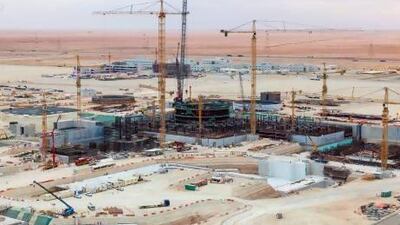ABU DHABI // When the UAE’s first nuclear-power plant opens at Barakah in 2017, an estimated 2,000 people will be working on the site and living in Al Ruwais with their families.
The area is undergoing major developments in preparation for the new community, said Fahad Al Qahtani, the external communications director at Emirates Nuclear Energy Corporation (Enec).
“To quote our chief executive, for every nuclear-plant employee we will need six workers in supporting services,” Mr Al Qahtani said.“These supporting services include schools, shops, restaurants and so on.”
This means the town, in the Western Region 240 kilometres west of Abu Dhabi city, will see rapid growth, with at least 17,000 people arriving: 2,000 plant workers with 3,000 family members, plus 12,000 support workers.
“We are working closely with the Abu Dhabi Government, the Urban Planning Council and the Western Region Development Council [WRDC] on developing the region,” Mr Al Qahtani said.
According to the Al Gharbia Investment Road Map, which was set up by WRDC, nuclear power will contribute Dh62 billion in capital to the Western Region.
In March, WRDC announced the region was set to become the country’s next development hot spot, with economic output expected to top Dh500bn by 2030. In 2010, GDP in the region was Dh243bn.
“In the next five years, Al Gharbia will witness the completion of the initial stages of a number of multibillion-dollar projects, such as the Madinat Zayed residential developments, a complex that will feature more than 100 apartments, retail shops, a health club, a mosque and offices, and the Ruwais Refinery Expansion, owned by Takreer, which when finished in the first quarter of 2014 will produce a total of 832,000 barrels per day of oil,” said Mohamed Hamad bin Azzan Al Mazrouei, the director general of WRDC.
Companies in the UAE have secured more than US$1bn (Dh3.7bn) in contracts for products and services to support the construction at Barakah, Mr Al Qahtani said.
“The contracts have been awarded through joint collaboration between Enec and the Korea Electric Power Corporation [Kepco] over the past three years as part of efforts to support and develop the local industry and cover a range of products and services, including marine dredging, the provisioning of steel, metals and cables, housing projects and site construction activities,” he added.
Enec’s chief executive, Mohamed Al Hammadi, said the world-class nuclear programme would need an extensive supply chain.
“The UAE has a large pool of experienced suppliers and we have found that many local suppliers are able to meet the high standards for safety and quality that we demand because of their wealth of experience with the oil and gas industry,” he said.
More than 180 UAE companies had been awarded contracts, Mr Al Hammadi said, and hundreds of local companies had registered for future supply opportunities.
A number of local companies were also working with Enec to become certified Nuclear Competent companies, he said, a key certification to become approved providers to the nuclear-energy programme.
"This new, high-technology industry brings economic growth, job opportunities, and supports the long-term development of Abu Dhabi and the UAE," Mr Al Hammadi said.
amustafa@thenational.ae

